Magnoliophyta - Study guides, Class notes & Summaries
Looking for the best study guides, study notes and summaries about Magnoliophyta? On this page you'll find 10 study documents about Magnoliophyta.
All 10 results
Sort by
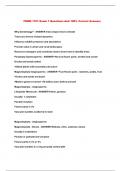
-
FNRM 1101 Exam 1 Questions And 100% Correct Answers
- Exam (elaborations) • 20 pages • 2024
-
- $7.99
- + learn more
FNRM 1101 Exam 1 Questions And 100% Correct AnswersWhy Dendrology? - ANSWER trees impact micro-climate Trees are drivers of plant dynamics Influence wildlife presence and abundance Provide value in urban and rural landscapes Resource managers and scientists need to know how to identify trees Pinophyta-Gymnosperms - ANSWER •No true flower parts -strobili and cones• Ovules and seeds naked •Oldest plants with secondary structure Magnoliophyta-Angiosperms - ANSWER •True flower parts ...
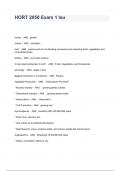
-
HORT 2050 Exam 1 lsu Questions And Answers
- Exam (elaborations) • 12 pages • 2024
- Available in package deal
-
- $10.99
- + learn more
HORT 2050 Exam 1 lsu Questions And Answers hortus - ANS garden culture - ANS cultivation Hort - ANS science and art of cultivating processing and marketing fruits, vegetables, and ornamental plants. botany - ANS pure plant science 3 main plant production in hort? - ANS Fruits, Vegetables, and Ornamental pomology - ANS apple or fruit Biggest production in Louisiana? - ANS Pecans Vegetable Production - ANS * Olericulture "Pot Herb" * Nursery indu...
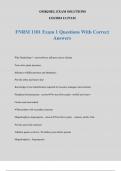
-
FNRM 1101 Exam 1 Questions With Correct Answers
- Exam (elaborations) • 31 pages • 2024
-
- $11.49
- + learn more
FNRM 1101 Exam 1 Questions With Correct Answers Why Dendrology? - answertrees influence micro-climate Trees drive plant dynamics Influence wildlife presence and abundance Provide urban and rural value Knowledge of tree identification required for resource managers and scientists Pinophyta-Gymnosperms - answer•No true flower parts -strobili and cones• Ovules and seeds naked •Oldest plants with secondary structure Magnoliophyta-Angiosperms - answer•True flower parts - stamens, pi...
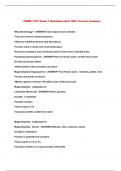
-
FNRM 1101 Exam 1 Questions And 100% Correct Answers
- Exam (elaborations) • 20 pages • 2024
- Available in package deal
-
- $11.99
- + learn more
FNRM 1101 Exam 1 Questions And 100% Correct Answers...

-
Botany Exam 2. Flashcards
- Exam (elaborations) • 19 pages • 2023
-
- $11.99
- + learn more
1st evidence of endosymbiotic theory - Mitochondira, chloroplasts and prokaryotes all have the same characteristics 2nd evidence of endosymbiotic theory - Chloroplasts and mitochondria passed to their next generations different things 3rd evidence of endosymbiotic theory - Some organisms engulf unicellular algae that function as chloroplasts Class Monocotyledonae (Liliopsida) families; - Classification of the tree Magnolia grandiflora • Phylum Magnoliophyta • Class: Dicotyledonae (...

-
Botanical Diversity - Must Take With Biol 3071 Crn 1514 (BIOL 3070) 2023-2024 Update
- Exam (elaborations) • 19 pages • 2023
- Available in package deal
-
- $11.99
- + learn more
1st evidence of endosymbiotic theory - Mitochondira, chloroplasts and prokaryotes all have the same characteristics 2nd evidence of endosymbiotic theory - Chloroplasts and mitochondria passed to their next generations different things 3rd evidence of endosymbiotic theory - Some organisms engulf unicellular algae that function as chloroplasts Class Monocotyledonae (Liliopsida) families; - Classification of the tree Magnolia grandiflora • Phylum Magnoliophyta • Class: Dicotyledonae (...
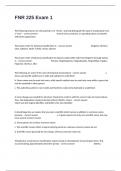
-
FNR 225 Exam 1 Practice Questions And Answers Guaranteed Pass.
- Exam (elaborations) • 5 pages • 2024
-
Available in package deal
-
- $13.99
- + learn more
The following features are characteristic of a "shrub", and help distinguish this type of woody plant from a "tree": - correct answer Several erect, prostrate, or spreading stems at maturity with bushy appearance The proper order for botanical classification is: - correct answer Kingdom, Division, Class, Subclass, Order, Family, Genus, Species The proper order of botanical classification for Quercus alba ...
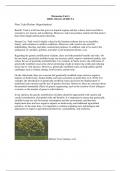
-
Plant: Teak (Phylum: Magnoliophyta)
- Other • 2 pages • 2023
-
Available in package deal
-
- $7.99
- + learn more
Benefit: Teak is a tall tree that grows in tropical regions and has a dense, hard wood that is resistant to rot, insects, and weathering. Moreover, teak trees produce natural oils that protect them from fungal and bacterial infections. Human Use: Teak wood is highly valued in the furniture industry due to its durability, beauty, and resistance to outdoor conditions. Moreover, teak wood is also used for shipbuilding, flooring, and other construction purposes. In addition, teak oil is used in the...
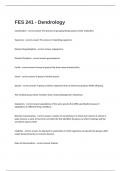
-
FES 241 - Dendrology exam questions and verified correct answers
- Exam (elaborations) • 8 pages • 2024
- Available in package deal
-
- $12.49
- + learn more
Classification - correct answer The process of grouping things based on their similarities Taxonomy - correct answer The science of classifying organisms Division Magnoliophyta - correct answer angiosperms Division Pinophyta - correct answer gymnosperms Family - correct answer Group of genera that share many characteristics Genus - correct answer A group of similar species Species - correct answer A group of similar organisms that can breed and produce fertile offspring. The...
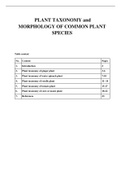
-
Plant taxonomy and morphology of common species.docx
- Summary • 23 pages • 2022
-
- $7.49
- + learn more
Flowering plants are a kind of vascular plant that reproduces by producing flowers. Therefore, flowering plants, are also known as Angiospermae or Magnoliophyta. They are the most diverse group of ground plants, with 64 orders, 416 families, nearly 13,000 known genera, and 300,000 known species. Angiosperms are vascular plants. They have stems, roots, and leaves. Unlike gymnosperms such as conifers and cycads, angiosperm seeds are embedded in a flower. Angiosperm eggs are fertilized and grow in...

How did he do that? By selling his study resources on Stuvia. Try it yourself! Discover all about earning on Stuvia


